Hello readers! This post is free, but as of May 20, this is the kind of piece that will be for subscribers only. You can get 10 percent off your subscription if you sign up before then.
You recently met Yves Kulondwa, my superhero stringer in Bukavu. I wrote about how skeptical I was to hire this young man in 2017 to cover the trial of the Kavumu rapists. (It was too dangerous for me to head back to Congo to do it myself.) He told me he was a cartoonist with no writing or reporting experience and, well, you can read about my discomfort about that here.
But, as you also learned, not only is Yves a remarkable writer and reporter, he is an extraordinary artist. Many of you have asked to hear more about him, so here you go. We did this Q&A via email this week because he has very expensive, “turtle speed” internet. Yves’s English is excellent, but he agreed to have me change certain words for clarification.
First, a little bit about him. He is 29, single, and works at a newspaper called Le Souverain Libre, which is the very rare Congolese newspaper headed by a woman. He also runs an art club for kids — I’m going to list at the bottom of this post what kinds of supplies he badly needs and how you can donate toward the club. He is currently working on a graphic novel about what happened in Kavumu.
And, in his own words (which he posted in a comment thread here), he thought he had been prepared to cover the trial, based on his own difficult life experiences. He was wrong:
“Well, I initially thought that, as I had already lived through two wars (the first one I was 5 years old, in 1996, and the other one, the ‘Mutebusi war’ a few years later ); well, I thought I was already ‘armored’ in some way. I had seen people injured and even died quite young, and I told myself that nothing more could impress me. I clearly was wrong. … We dare not even imagine what these little beings must have felt when they opened their eyes in the dark, gripped by dirty and rough hands. Horror.”
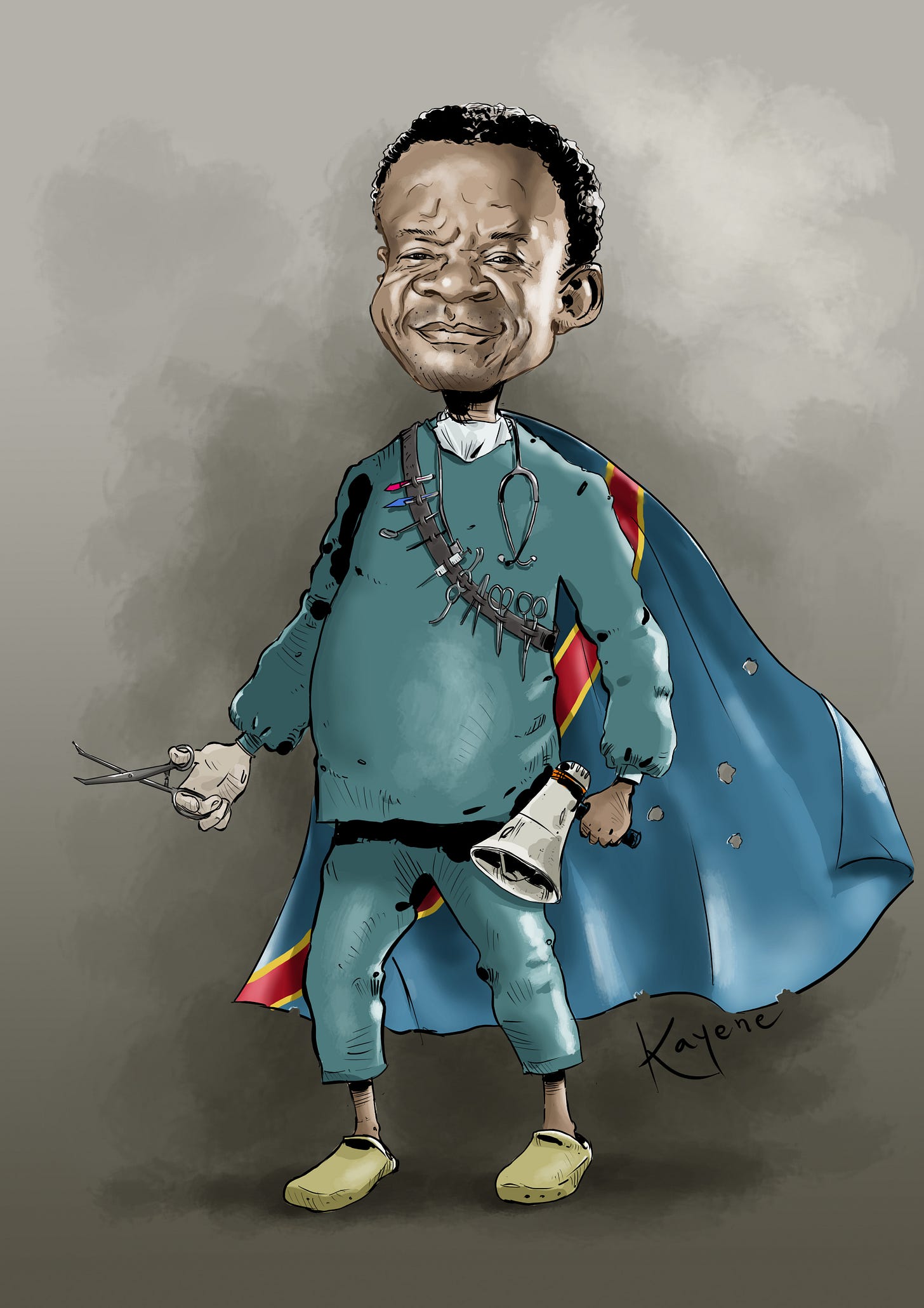
Here’s our Q&A:
Me: When I approached you as a stranger, did you feel equipped as a journalist to report from the trial? Was it strange to make such an arrangement with a person you didn’t know, from so far away?
Yves: I must admit that I was a little apprehensive. I was just starting out in journalism, and I had never set foot in court before, or attended a real trial. The only one I had taken part in was in a theatrical court; the “Das Kongo Tribunal” project by Swiss director Milo Rau. I was the courtroom artist.
As a young, beginner journalist, I was super excited to be able to “collaborate” with a journalist of this caliber! I was therefore determined to surpass myself, to provide 100 percent effort, paid or not! [He was paid.]
Me: I know you’d been a cartoonist, illustrator, and photographer, but not a reporter who writes. Were you excited? Scared? How did you feel taking on this assignment?
Yves: That's right. Until then, I hadn’t done any reporting or published an article (except during my journalism training). However, I think I had a sort of writing predisposition that I hadn't really exploited yet. In high school, I had fairly good writing and essay marks. As I was already in love with reading, I also sometimes wrote things, like my little personal thoughts for example, or a small one-page comic book script ...
It is clear that I had stage fright. I had no idea how you would judge my writing! Average, bad, mediocre ... and my English was far from perfect. But I said to myself, Come on, be yourself and go for it!
Me: Your first day in that courtroom did you feel confident? Was it harder or easier than you thought it would be?
Yves: That first day, I was the first one to arrive on the scene. That’s how excited I was!
I couldn’t wait to discover, learn, understand! Since the start was scheduled in the morning, I arrived quite early, around 7 a.m. I observed, I drank it all in, I wrote. But my enthusiasm gradually waned as the hours went by, one by one, under a hot sun, as no one showed up to the room that was to serve as a tribunal.
It was only very late in the evening that peacekeepers from the United Nations mission began to arrive, followed by lawyers from both parties, then the van of the defendants. Then, things accelerated in a short period of time. My boredom, my fatigue, my hunger disappeared. All my senses were on alert again. Let's say that my impressions fluctuated quite a bit on that first day!
Me: You recorded a huge amount of information in those weeks. I was blown away by the length and detail in your reports. Are you always so thorough in all your work and other parts of your life?
Yves: Indeed, yes. Especially concerning work! It may have nothing to do with it, but I am rather reserved by nature, bordering on shy. And so I hate to beg, be it for money, material help or even — work!
So, I manage (as long as I can) to do my job as perfectly as I can, so that my client will want to recommend me to others, and so on — I know, I will have to get therapy one day! Otherwise, I'll die poor!
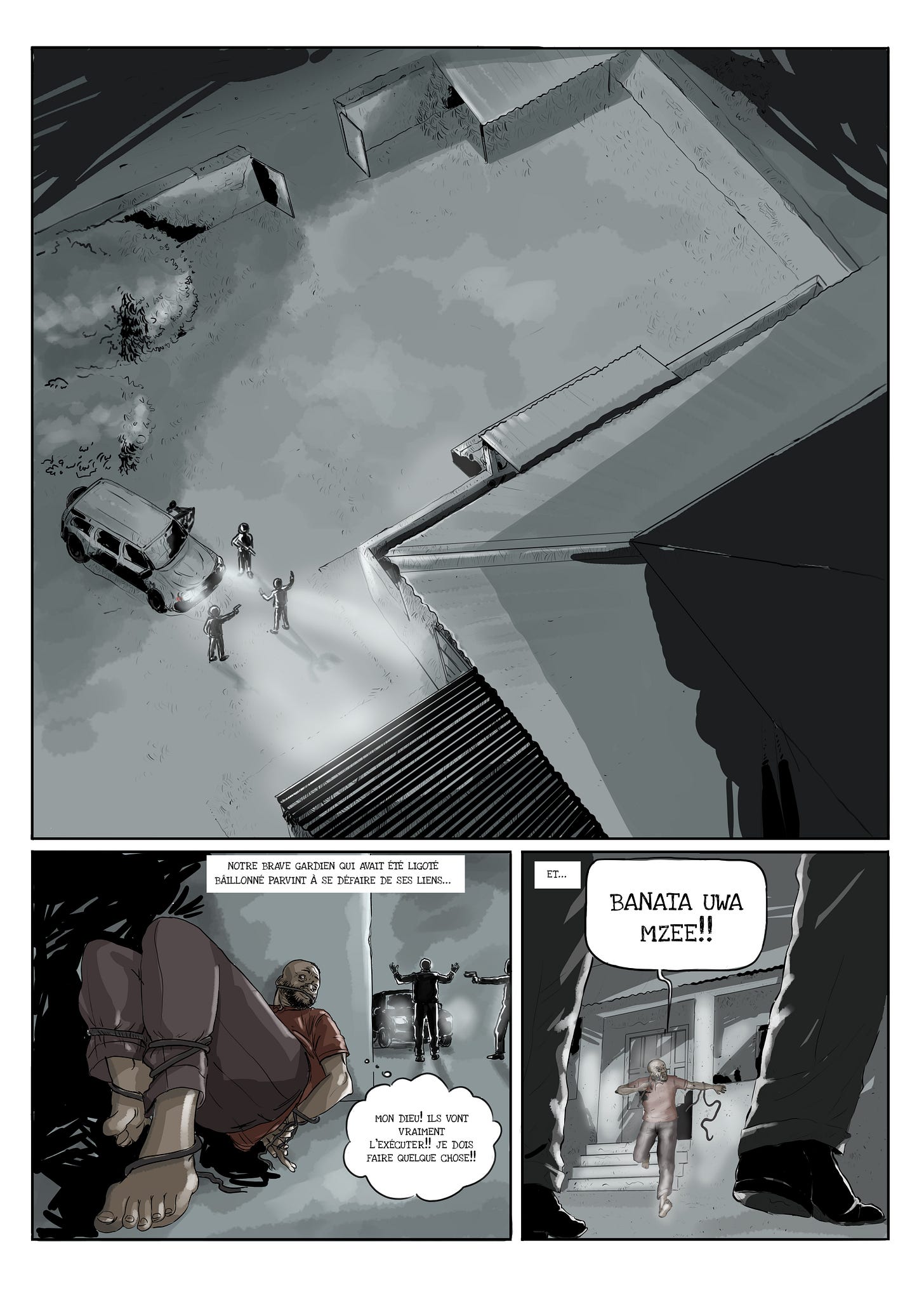
Me: Tell me about your art. How did you start? Why? Did your parents encourage you? Were they any art classes you could take?
Yves: I started out like most artists, quite young, drawing in my notebooks in elementary school. Obviously, I was rapped on the fingers. But I am stubborn. I continued despite this.
I think that's partly because of the shyness that I alluded to above. I found it hard to reach out to others, to talk to them. So, to get their attention, I drew. And, out of curiosity, they came to see me, and were interested in my drawings and me. It was (and still remains today) my way of expressing myself.
At first, my mother couldn't see it positively. Considering that there was not a single celebrity in the whole city [Bukavu] who had made a success of their life through art, I think it made sense that I was not supported at first. But that all changed the day I won the regional comic book competition on the life of a martyred Catholic Archbishop (Bishop Munzihirwa). It was organized by the French Institute of Bukavu. I was 13 at the time and the second winner was 41! After that, my mother would let me draw — but after doing my homework. Unfortunately, in the Congo, the only two art schools are thousands of kilometers away, in Kinshasa and Lubumbashi and there was no financial way for me to go to either academy. So I had to learn on my own, copying drawings from comics and magazines. It was not until much later that I was able to acquire art books to learn from. And more recently, with the advent of the internet, access to art classes has become more democratic.
After graduating from high school, I started studying economics at university, while continuing to draw at the same time. After three years, I graduated, but then I radically changed course.
Because it was at this moment that I was asked for the first time by a newspaper to make a caricature! I directly fell in love with the press. I paid for a year of journalism training myself, and graduated with honors. And ever since then, I am now in between journalism and art. With luck and a little determination, I had the opportunity to go do an internship in Germany and get some additional training in digital art. Then, I went to Belgium for courses and an internship in journalism and communication at IHECS.
Me: How did it feel drawing while you were in the courtroom? You must work quickly.
Yves: It was indeed a challenge! Following the trial, taking notes, photos, some videos and drawing at the same time. It was not easy, sure, but sometimes I like to test myself, and see how far I can go! At the same time, I must admit it was exhilarating! And then, if we can write that a witness had a quavering voice during his testimony, and illustrate it with a drawing, why not!!
Me: I know you were running an art group for kids. What was that like? What were the challenges? Are you still doing it?
Yves: Yes, the club still exists. In fact, it started because there was no art school in the province [South Kivu]. So an artist friend and I created this club to help young kids who wanted to get into the field. Having experienced the same thing, I knew how difficult it was for a young person who’s just starting out to find benchmarks and courses, or to orient themselves in order to be able to eventually make it their profession.
So, we felt that it was a sort of duty, we who had already acquired a certain experience, to supervise them, transmit to them what we already knew and guide them. We give them lessons, we provide them with materials, and we provide them with a small room that we rent in town.
We’ve never had any support from the government, despite numerous letters to the Cultural Promotion Fund. We operate thanks to the contribution of members who can already earn a few cents, like me. But it is very complicated. Despite that, the young people have made considerable progress. Apart from that, we have done some art therapy sessions with children of women rape survivors at the Panzi Foundation. Free, of course!
Me: Tell me more about how you felt as the trial progressed? What did you most want to capture that you could send me so we could turn it into a piece that would hopefully be read by the world?
Yves: I think I went through all kinds of emotions during this trial! I was, among other things, astonished to discover the faces of these men, as well as the motive behind their acts, which then disgusted me. I was angry to learn that they had been spared from justice for so long because they belonged to a political group in power.
I was horrified to see the mutilated bodies of the little girls, and, in the end, I was happy and satisfied that the perpetrators had been condemned, and that they would pay for their deeds.
However, I also believe that I felt a kind of injustice at the end of this trial. Not for the victims, but for those who mainly contributed to the arrest of the executioners. You, [Colonel] David Bodeli — no one has ever mentioned your names, and yet we know that without you, there would never have been a way out of this terrible affair! Even I, who was in media, never knew your role before I learned it from you, yourself! We didn’t know your role in the outcome of this affair, not only in South Kivu, but also in all of Congo. And I think that is very unfair!! People must know! Unfortunately, the vast majority of my compatriots do not have access to Chills, let alone the international press! This is the reason why I took the initiative to resume your story, and tell it in graphic novel format, which is more accessible to all! I think the best way to prevent such crimes from happening again is to talk about it, to tell it to the old and young alike, as is done in Rwanda every year. And I’m sure I’m not the only one to think so!
Me: The day the verdict was announced — I can’t imagine what that was like, not only as a reporter deeply invested in covering the trial, but as a man who lives among these men, and cares deeply about the rights of women. How did you feel?
Yves: Oh, that was special! At first (even before the trial), I think I was like everyone else. I came to report on the trial of a group of men who kidnapped and raped babies. I was disgusted by them from the start, but nothing more. It was as the trial, testimonies and photo evidence developed that I really realized the extent of the situation! It was much creepier than I ever imagined, and my disdain for these stupid characters was absolute! I was supposed to be neutral as a reporter, and usually I don't express my emotions, but that day I left with a small tear in the corner of my left eye (luckily I was wearing glasses).
Me: In this horrible year of Covid-19, what has it been like for you? We both lost our mutual friend, Mama Leki. Did you lose others?
Yves: It was very hard this period, indeed! Fortunately, I haven’t lost anyone in my immediate circle! But some friends have lost parents or members of their families. But the crisis has been even harder (unfortunately it still is) on the financial level. Since the newspaper closed in March 2020, it’s been quite complicated financially. In addition, the few international NGOs with which I sometimes collaborated have interrupted most of their activities.
Despite that, with a few portraits here, one illustration or two there, I try to hold on, until things get better. Hopefully soon!
Me: What else do you want to tell me or my readers?
Yves: To you: Don’t change anything!! Remain that beautiful, courageous soul that you are! And to your readers (whose comments I often read): Continue reading, and always be as kind in real life as in your comments!
And to those among you who have a colored pencil lying around somewhere in a drawer, or a comic book that they no longer read, or anything else to support young artists from Bukavu, do not hesitate! Thank you.
Donations
If you’re interested in helping Yves cover costs and buy equipment for his art students, here are some of the ways you can donate:
There are some things he said he would love to have for the club but can’t get in Congo. These include: computers, graphic tablets (for digital art and animation), cameras, a projector (for the classroom), an A3 scanner.
You can safely send such donations to: Mubalama Rutishema Olivier, P.O Box 555, Cyangugu/Rwanda.
And there are other things that can be purchased in the country to save money: paints, knives, acrylics, markers and pencils, drawing papers, canvases and frames, glue for papier-mâché, scissors for sculpture, etc.
And if possible, he would like to rent a showroom for an exhibition of the students’ art this year.
Yves and I have discussed the best way to send monetary donations. There is no simple app or no-fee way to send money to Congo. In the past I have used Western Union. But we’ve agreed that in order to avoid everyone losing money (on both sides) on each transfer because of transaction fees, you can send the donations to me, between now and May 15, and I will send them all at once via Western Union to Yves. My Venmo: @Lauren-Wolfe-10. Please note that the donation is for Yves. And thank you.

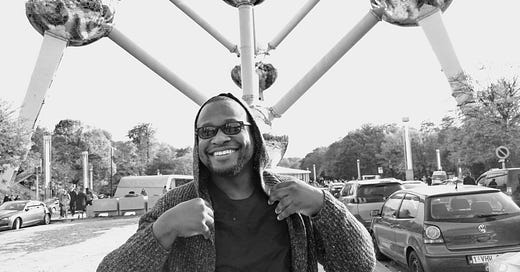



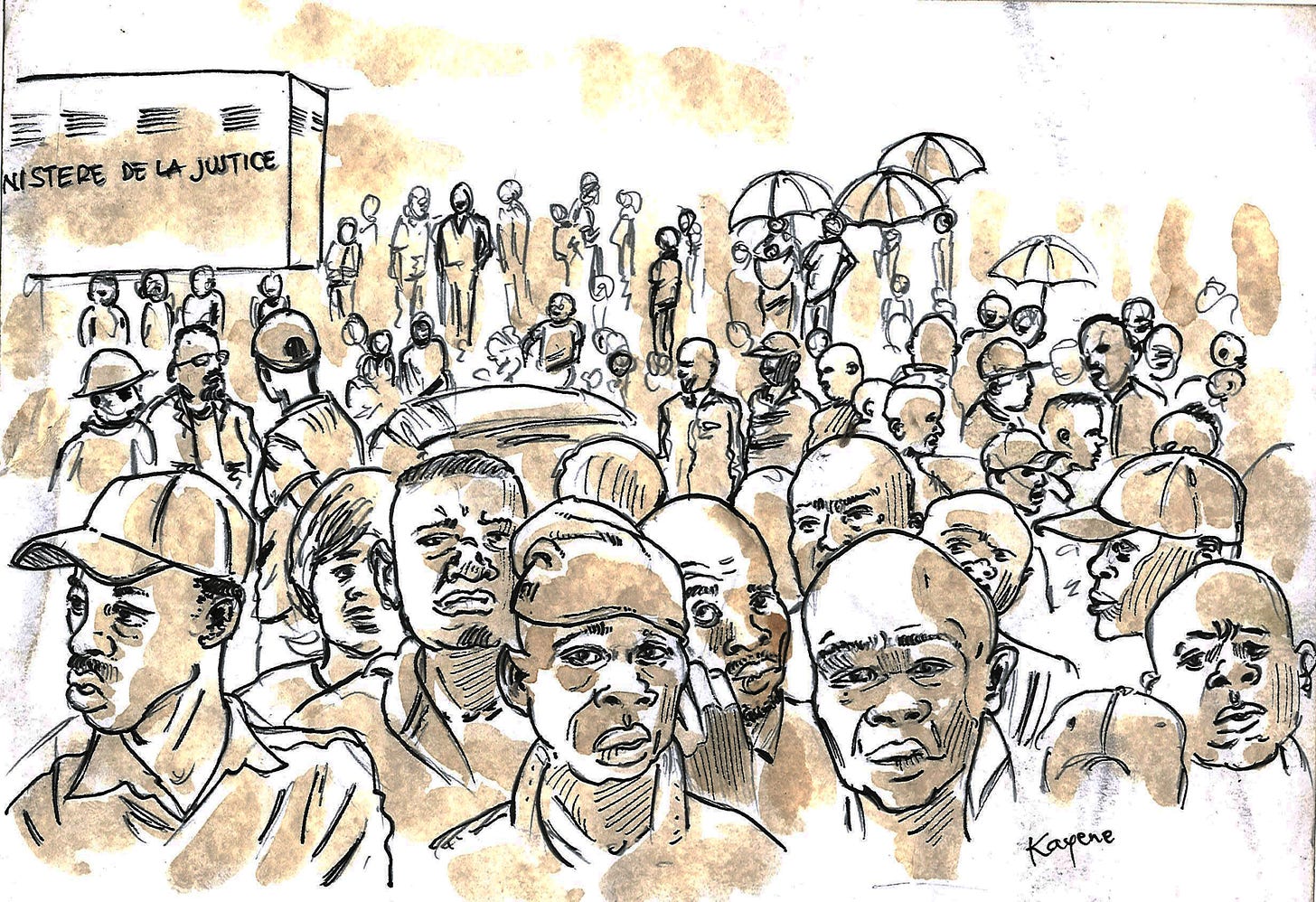
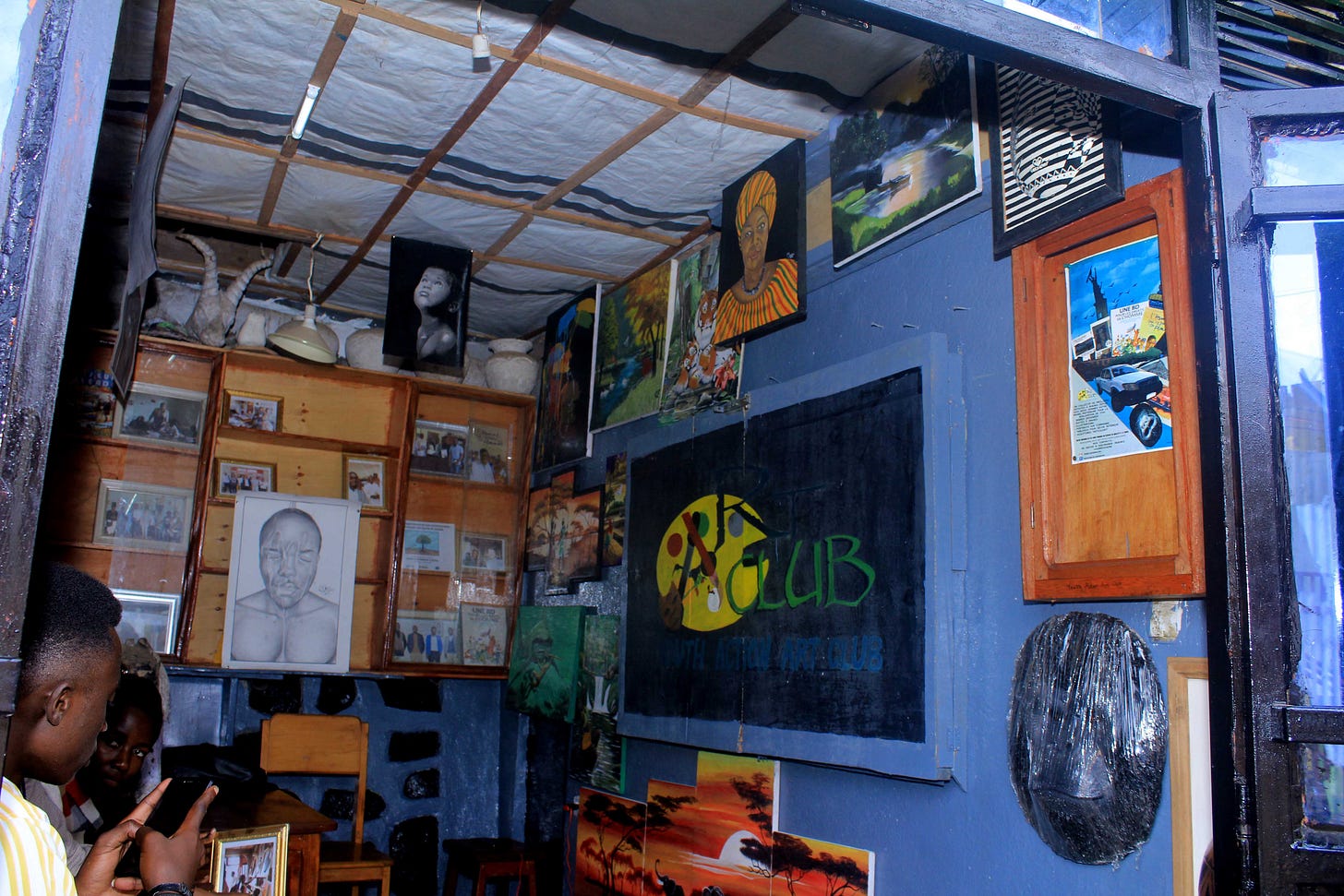
There's a lot to be said for comic strips as a form of journalism. I'm surprised it doesn't happen more.
Thank you so much for including this interview, what an interesting and talented artist and reporter.